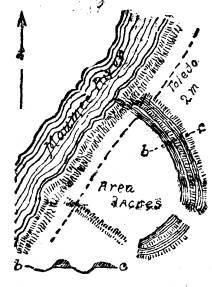Ohio History Journal
Mound Builders' Fort within Toledo's
Limits. 381
MOUND BUILDERS' FORT WITHIN TOLEDO'S
LIMITS.
BY S. S. KNABENSHUE, TOLEDO, OHIO.
It will probably surprise most of the
readers of the Quar-
terly to be told that there once existed
an ancient defensive earth-
work on the banks of the Maumee, within
the present city limits.
The writer was unaware of the fact until
some time ago, when he
found a reference to it in a somewhat
rare book-the first volume
of the Smithsonian Contributions to
Knowledge, printed in 1848.
It is a copy of "Ancient Monuments
of the Mississippi Valley,"
by Squier and Davis. In the chapter
devoted to works of de-
fence, is a section on such ancient
forts in Northern Ohio, writ-
ten by Hon Charles Whittlesey, of
Cleveland, whose archaeolog-
ical researches were both extensive and
accurate. The follow-
ing is Mr. Whittlesey's account of the
Toledo work:
"This work is situated on the right
bank of the Maumee
river, two miles above Toledo, in Wood
county, Ohio." (It is
now in Lucas county, and within the city
limits. The writer does
not know whether Mr. Whittlesey was in
error in placing the
work in Wood county, or whether the
county line has been changed
since his account was written.) The
water of the river is here
deep and still, and of the lake level;
the bluff is about 35 feet
high. Since the work was built, the
current has undermined a
portion, and parts of the embankments
are to be seen on the slips
a, a. The country for miles in all
directions is flat and wet,
though heavily timbered, as is the space
in and around this enclo-
sure. The walls, measuring from the
bottoms of the ditches,
are from three to four feet high. They
are not of uniform
dimensions throughout their extent; and
as there is no ditch on
the southwest side, while there is a
double wall and ditch else-
where, it is presumable that the work
was abandoned before it
was finished."
The site of this ancient work is on the
East Side, a little
above the end of Fassett street bridge,
and directly back of the
C., H. & D. elevator. The greater
part is an unfenced common,
